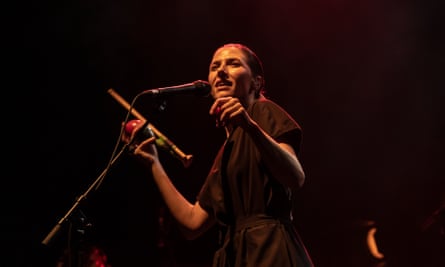Twenty minutes into Aldous Harding’s set, after a spellbinding version of Treasure, from her 2019 breakthrough album Designer, has provoked a particularly vociferous response from the crowd, she speaks her first words to the audience. It feels oddly like a warning. “I am friendly and open,” she says. “But we do have to do things my way.”
As warnings go, it feels a little after the fact: you could have worked out Harding is intent on doing things her way pretty much from the moment she walked on stage. That means a gig punctuated by long, pregnant silences – “the no charisma between songs thing”, as she puts it – during which Harding adjusts her microphone stand, moves a chair across the stage and switches instruments, which she has a habit of looking at as if she’s never seen them before. When she does say something, it’s often a non sequitur: “I found this guitar in a river”; “I need a reset because this” – the venue – “is … a dome”.
When not playing an instrument – a nylon stringed guitar, a tambourine which she flaps up and down vertically rather than shaking, a cabasa – she accompanies her vocals with stagey movements, stalking around while slowly turning her head from side to side like someone walking into an unfamiliar environment and sizing it up, or dancing with a deliberately tentative ineptness, as if she’s at the edge of a dancefloor, unsure of whether to join in. She has a beautiful voice, powerful and crystalline, but it’s occasionally disrupted by unexpected yelps, and continually twisted into peculiar, unplaceable accents.
The opening of Tick Tock feels like a dialogue is taking place between two characters – one with a Lou Reed-ish drawl, the other fluting, high and sweet – albeit a dialogue that doesn’t make much sense: “The dirty of it ripped the label, I believe him, man holy.” There is also a degree of face-pulling going on. Harding’s musical influences are not easy to define – she doesn’t mention any in her interviews, where she remains as elusive a presence as she is on stage – but you can detect a hint of early Talking Heads about the staccato Old Peel, which feels telling: her brand of stagecraft also carries something of David Byrne’s old disruptive awkwardness.
after newsletter promotion
You could find all this enrapturing, discomfiting or a little too mannered and self-consciously weird for its own good: tonight’s audience – pin-drop attentive at all times – fall into the first category. The really weird thing about Harding is that, for all the performative strangeness, funny voices and inexplicable lyrics, what lies at the centre of what she does is remarkably straightforward and prosaic. Aside from the fragmentary Bubbles – and a moment during Fever where her drummer doubles up on trumpet, a rather impressive feat in itself – the songs’ arrangements are simple: lilting, muted keyboard-driven soft rock, blessed with a melodic facility that’s far more striking than any of the attendant idiosyncrasies.
Staring at the Henry Moore has a lovely, cascading tune; there’s an ease and a flow to The Barrel that the jarring lyrical imagery can’t derail. Passion Babe’s hook drills deep into your brain, regardless of the fact that she’s singing it in an oddly strained, nasal tone. It lingers long after Harding slowly departs the stage, waving as she goes, but frowning, as if the applause, like the instruments she plays, is unfamiliar to her.

